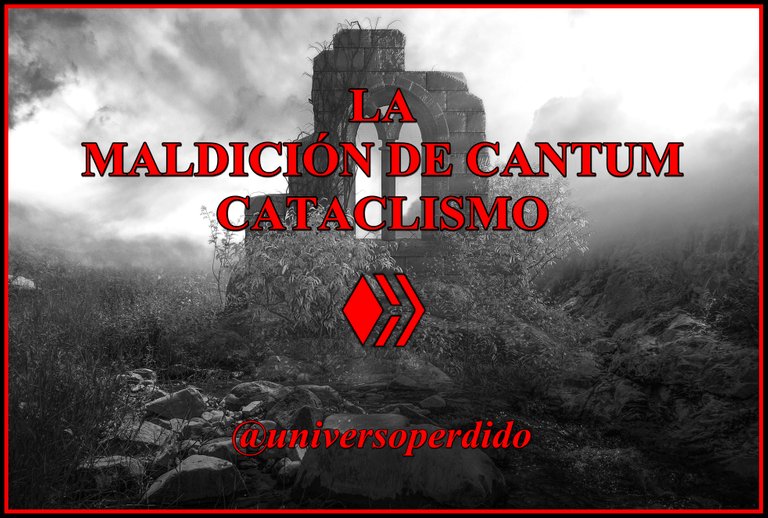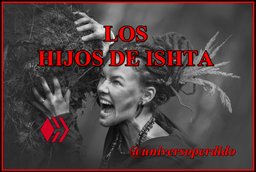[ESP-ENG] LA MALDICIÓN DE CANTUM: CATACLISMO (Short Story)

Original image | Edited with PhotoScape
«La identidad de una persona no es el nombre que tiene, el lugar donde nació, ni la fecha en que vino al mundo. La identidad de una persona consiste, simplemente, en ser, y el ser no puede ser negado.»
«A person's identity is not the name they have, the place where they were born, or the date they came into the world. A person's identity consists simply of being, and being cannot be denied.»
—José Saramago

ESPAÑOL
LA MALDICIÓN DE CANTUM: CATACLISMO
Después de que los sacerdotes leyeran la terrible palabra como una predicción oscura, sobre La Pared Sagrada de los Lamentos, escrita por Nahain, el más sabio y viejo de los Tanari, quien cayó en deceso después de haber escrito la palabra «Venganza» con su sangre en idioma «Niunsu», una de las primeras lenguas de Isahara y la única en usarse para anunciar portentos infortunados. Luego de que el horror los abrazara, acudieron a los nobles guerreros de Cantum, y estos, a su vez, informaron tal singularidad en la corte real, donde finalmente llegó a oídos del rey «Carsint», quien gobernaba para ese entonces.
La ciudad de Cantum atravesaba un periodo de expansión y prosperidad ascendente y fortuito, creían en aquel entonces que eran indetenibles. Habían conquistado con osadía y severidad de esquina a esquina a toda la región de Isahara, tomando así como suyo a cualquier otro pueblo que quisiese establecerse en sus territorios, esclavizándolo al instante.
El rey Carsint, al vislumbrar su obra y lo lejos que estaba llegando, se llenó de ambición y alegría y no permitiría así mismo que su imperio en expansión se detuviese. Por lo tanto, el terrible presagio encontrado en el Gran Templo le pareció tan trivial y reaccionó escéptico ante eso. Mantuvo en secreto la anomalía entre la aristocracia de Cantum y los herméticos sacerdotes y evitar así que se propague el pánico por la ciudad.
Ni la predicción de una maldición, que pareciera provenir de la bruja «Ishta», madre de los «Ishtú», quienes fueron destruidos por los pueblos nómadas que construyeron Cantum, podría detener el deseo de poder y expansión que poseía la ciudad a través de su regente monarca. Aquella gran urbe se desarrolló gradualmente en belleza y potestad, puesto que el poderío militar de Cantum era incomparable e irrefrenable al enfrentar.
Los papiros de las viejas bibliotecas del Viejo Mundo, cuentan que sus planes eran formar un gran imperio, y este, sino hubiese ocurrido aquello, hubiera sido el primero de la antigüedad. Dentro de Cantum había edificios de apartamentos de varios pisos. Casas labradas con hermosos ladrillos dorados y cocidos, que otorgaban la ilusión de una ciudad hecha de reluciente oro.
Había grandes plazas con enigmáticas fuentes construidas con mármol pulido establecidas en el centro de estas, y sus aguas cristalinas provenían de las diversas lagunas que se encontraban por los diferentes terrenos y planicies de Isahara. Los muros y almenas eran como titanes que vigilaban y resguardaban la ciudad, con una altura de cincuenta pies y una anchura de trecientos codos, mucho más imponentes que la presencia de un temible galeón.
La ciudad era patrullada día y noche por poderosos centinelas, que ante la quietud, no bajaban ni por un momento la guardia. Durante los días de celebración en que la ciudad festejaba sus vísperas religiosas, había comidas exóticas, bailes y espectáculos provenientes de los distintos pueblos de Isahara. Esos días eran los más temidos por los sacerdotes, especialmente para los Tanari, los que eran ciegos, ya que durante esos días se declaró la guerra a los Ishtú, condenándolos a su destrucción.
El Gran Templo temblaba más que celebrar a los titanes, porque temían de la venganza profetizada por el fallecido Nahari. Y esa noche, en que las luces de Cantum eran más deslumbrantes que cualquier otro día, el cielo se cubrió por una bruma espesa que contantemente se movía y oscilaba en una secuencia de olas vaporosas.
Los sacerdotes videntes que podían vislumbrar aquella extraordinaria rareza natural, se escondieron dentro del Gran Templo y apagaron todas las lámparas y antorchas, mientras que las tenebrosas nubes paulatinamente descendían sobre la ciudad, exponiendo el destello estruendoso de relámpagos cegadores. Todas las luces de la ciudad se apagaron, los murmullos y los gemidos de terror comenzaron a concentrarse en oleadas por las calles y las casas.
El cielo constantemente se agitaba con fuerza y cada vez más rápido hasta convertirse en una gran bestia cubierta de sombras, que se paró sobre la ciudad y poco a poco la envenenaba. Y fue durante esos instantes espantosos en que los edificios comenzaron a derruirse. Las calles se agrietaban y las hermosas plazas se levantaban y destruían. Las personas corrían en manada y algunas de ellas vislumbraron con horror como se fisuraba el gran palacio del rey.
El último llanto de alarido que se escuchó como terrible tumulto, fue el de Carsint, quien al divisar el cielo avistó un rostro de una serpiente, con radiantes ojos violetas y fauces colosales. La ciudad de Cantum raudamente se hundía hasta terminar en una inminente implosión, que la destruyó por completo. No quedaron ni cimientos que atestiguaran en detalle lo maravillosa que fue esa ciudad, solo escritos antiguos. Existe un pasaje que habla de lo que pasó después de la desaparición de la gran urbe. Relata que al otro día, después de lo sucedido, emergió de las arenas contraídas una estatua dirigida a los dioses reptantes.
FIN
ENGLISH
THE CURSE OF CANTUM: CATACLYSM
After the priests read the terrible word as a dark prediction, on The Sacred Wall of Wails, written by Nahain, the wisest and oldest of the Tanari, who fell in death after having written the word "Revenge" with his blood in "Niunsu" language, one of the first languages of Isahara and the only one used to announce unfortunate wonders. After the horror embraced them, they went to the noble warriors of Cantum, and these, in turn, reported such uniqueness in the royal court, where it finally reached the ears of the king "Carsint", who ruled by then.
The city of Cantum was going through a period of upward and fortuitous expansion and prosperity, they believed at that time that they were unstoppable. They had conquered with boldness and severity from corner to corner the whole region of Isahara, taking as their own any other people that wanted to settle in their territories, enslaving them at once.
The King Carsint, when he glimpsed his work and how far he was reaching, was filled with ambition and joy and would not allow his expanding empire to stop. So, the terrible omen found in the Great Temple seemed to him so trivial and he reacted skeptically to it. He kept secret the anomaly between the aristocracy of Cantum and the hermetic priests, and thus avoided the spread of panic in the city.
Neither the prediction of a curse, which seemed to come from the witch "Ishta", mother of the "Ishtu", who were destroyed by the nomadic peoples that built Cantum, could stop the desire of power and expansion that the city possessed through its monarch regent. That great city gradually developed in beauty and power, since the military power of Cantum was incomparable and unrestrainable when confronted.
The papyri of the old libraries of the Old World say that their plans were to form a great empire, and this, if that had not occurred, would have been the first of the antiquity. Inside Cantum there were apartment buildings of various floors. Houses carved with beautiful golden and baked bricks, which gave the illusion of a city made of shining gold.
There were large squares with enigmatic fountains built with polished marble established in the center of these, and their crystalline waters came from the various lagoons that were found throughout the different lands and plains of Isahara. The walls and battlements were like titans that watched over and protected the city, with a height of fifty feet and a width of three hundred cubits, much more imposing than the presence of a fearsome galleon.
The city was patrolled day and night by powerful sentries, who in front of the quietness, did not lower their guard for a moment. During the days of celebration when the city celebrated its religious vespers, there were exotic foods, dances and shows coming from the different towns of Isahara. Those days were the most feared by the priests, especially for the Tanari, who were blind, since during those days war was declared to the Ishtu, condemning them to their destruction.
The Great Temple trembled more than celebrating the Titans, because they feared the revenge prophesied by the deceased Nahari. And that night, when the lights of Cantum were more dazzling than any other day, the sky was covered by a thick mist that constantly moved and oscillated in a sequence of vaporous waves.
Sighted priests, who could glimpse that extraordinary natural rarity, hid in the Great Temple and extinguished all lamps and torches, while the dark clouds gradually descended on the city, exposing the thundering flash of blinding lightnings. All the lights of the city went out, the murmurs and groans of terror began to concentrate in waves through the streets and houses.
The sky was constantly shaking with force and faster until it became a great beast covered with shadows, which stood over the city and slowly poisoned it. And it was during those frightful moments when the buildings began to collapse. The streets were cracking and the beautiful squares were rising and destroying. People ran in herds and some of them glimpsed with horror how the great palace of the king was cracked.
The last scream heard as a terrible tumult was that of Carsint, who, when he saw the sky, saw a face of a snake, with radiant violet eyes and colossal jaws. The city of Cantum was rapidly sinking until ending in an imminent implosion, which completely destroyed it. No foundation remained to testify in detail how wonderful that city was, only ancient writings. There is a passage that speaks of what happened after the disappearance of the great city. It tells that the next day, after what happened, a statue addressed to the crawling gods emerged from the contracted sands.
THE END
Escrito por @universoperdido. 09 de Enero del 2021
Written by @universoperdido. January 09, 2021

Relatos anteriores | Previous stories
| [ESP-ENG] LOS HIJOS DE ISHTA |  |
|---|---|
| [ESP-ENG] LA MALDICIÓN DE CANTUM I |  |
| [ESP-ENG] EL OLVIDO |  |

¿Eres escritor? ¿No encuentras un lugar adecuado para colocar tus trabajos literarios? Unete a Literatos, una comunidad en Hive donde puedes publicar tus cuentos, poemas, ensayos literarios y novelas inéditos de tu propia autoría.

Excelente trabajo de ficción, @universoperdido!! No puedo dejar de pensar en todos los terribles males que ha vivido la humanidad por el egoísmo y la sed de poder del hombre. He visto, lamentablemente, muchas Cantum y muchos Carsint en el mundo, desvanecerse con el tiempo. Saludos y gracias por compartir
Gracias por leer amiga @nancybriti, efectivamente la ambición es uno de los males más nocivos del mundo, que al final trae consecuencias. ¡Saludos!